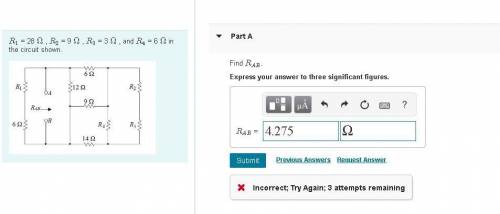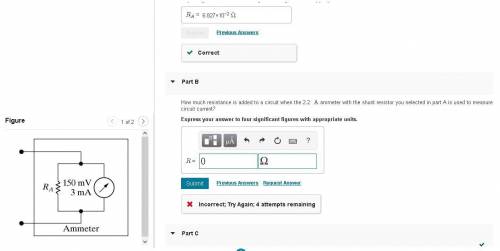
Engineering, 13.02.2022 05:10 CassidgTab
For these problems I feel like I am close but i don't quite fully understand them yet.
For calculating R_AB, I am not sure how the A and B terminals affect the whole circuit. Ive calculated the resistance of the circuit as a whole as if terminals A and B were not even there and calculated the resistance as if the resistances were in parallel from node A and node B. But i still get the wrong answer.
For the second question when calculating the solution for part B, I am also not sure how to calculate the resistance added by the ammeter. I know how to calculate the resistance of the shunt resistor though, how do i calculate how much resistance was added to the circuit. I calculate 50 ohms every time by dividing 150mV by 3mA.
Any help and direction is greatly appreciated



Answers: 3


Other questions on the subject: Engineering

Engineering, 04.07.2019 18:10, redrosesxx
Water at 55c flows across a flat plate whose surface temperature is held constant at 95c. if the temperature gradient at the plate's surface for a given value of x is 18 c/mm, find a) local heat transfer coefficient. b) heat flux
Answers: 3

Engineering, 04.07.2019 18:10, jojoangelique13
The flow rate of air through a through a pipe is 0.02 m5/s. a pitot static tube is placed in the flow. the radius of the pitot static tube is 1 mm. assuming the flow to be steady and the air to be at 300k, calculate the difference in total and static pressure if the diameter of the pipe is: (a) d 0.1 m d 0.05 m (c) d 0.01 m
Answers: 2


Engineering, 04.07.2019 19:20, natalie2sheffield
Acompressor compresses a gas, a pump compresses a liquid. for a given pressure ratio, why does it take more work to compress a gas in a compressor than a liquid in a pump? a)- for a given pressure ratio the average specific volume for a gas is much higher than the average specific volume for a liquid. b)- there is no difference. the only difference is the amount of heat generated (not work) c)- for a given pressure ratio the average volurge for a gas is much higher than the average volume for a liquid. d)-there is no difference
Answers: 3
You know the right answer?
For these problems I feel like I am close but i don't quite fully understand them yet.
For calcula...
Questions in other subjects:




English, 02.12.2019 07:31

Biology, 02.12.2019 07:31


Mathematics, 02.12.2019 07:31

Mathematics, 02.12.2019 07:31


English, 02.12.2019 07:31



